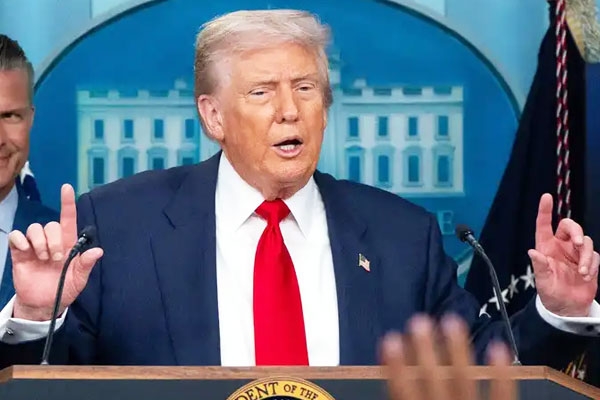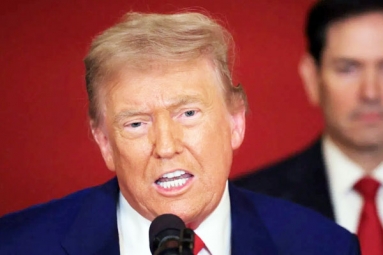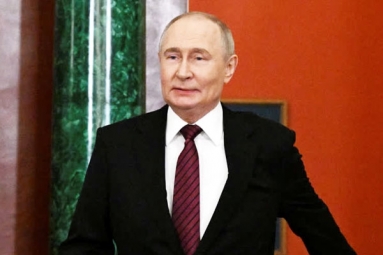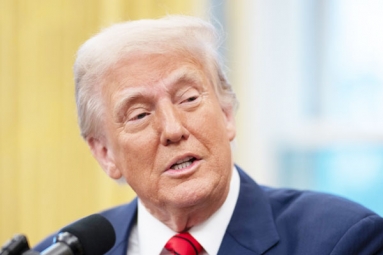
(Image source from: Economictimes.indiatimes.com)
On Monday, US President Donald Trump announced a postponement of the higher tariffs on Chinese imports just hours before a temporary trade agreement between Washington and Beijing was set to end. The pause on increased tariffs from the White House will last until November 10. Trump shared on his Truth Social platform, “I have just signed an Executive Order that will extend the Tariff Suspension on China for another 90 days.” This year, as the US and China imposed rising tariffs on each other's goods, reaching extremely high triple-digit rates and complicating trade, both countries agreed in May to temporarily reduce them. The existing 90-day suspension of these higher tariffs was expected to conclude on Tuesday. Coinciding with Trump's announcement of the extension, Chinese state media outlet Xinhua released a joint statement concerning US-China discussions in Stockholm, indicating that China would also prolong its part of the agreement.
According to the report, China will keep its previous plan to delay any further tariff increases for another 90 days starting August 12 while maintaining a 10-percent tax. They will also “take or keep necessary actions to suspend or lift non-tariff measures against the United States, as agreed in the Geneva joint declaration,” Xinhua added. In the executive order published on Tuesday on its website, the White House reiterated its stance that there are “large and persistent annual US goods trade deficits” which they view as “an unusual and extraordinary threat to the national security and economy of the United States.” The order also mentioned ongoing conversations between Washington and Beijing “to address the lack of trade reciprocity in our economic relationship” and recognized that China has taken “significant steps toward remedying” the US's concerns. The 90-day extension means the truce will now end shortly after midnight on November 10.
William Yang, an analyst at the International Crisis Group, cautioned that “Beijing will be pleased to keep the US-China discussions ongoing, but it is unlikely to make concessions.” He believes China views its control over rare earth exports as a significant advantage and is likely to use it to influence Washington. Sean Stein, president of the US-China Business Council, remarked that the current extension is “critical to give the two governments time to negotiate an agreement,” which would offer necessary certainty for businesses to plan. According to Wendy Cutler, senior vice president of the Asia Society Policy Institute, a trade deal would “open the door for a Trump-Xi summit this fall.” However, Cutler, a previous US trade official, commented that “this will be far from a simple task.”
Even though both nations made an agreement to reduce tensions after high-level discussions in Geneva in May, the progress on easing issues has not been stable. Important economic leaders met in London in June, where differences arose and officials from the US claimed that their counterparts were not sticking to the agreement. In Stockholm last month, policymakers gathered again. Trump shared on social media on Sunday that he hoped China would "quickly increase its soybean orders four times," suggesting this would help balance trade with the US. As part of their agreement from May, new tariffs from the US on China were lowered to 30 percent, while China's were decreased to 10 percent. Additionally, since he took office again in January, Trump has imposed a 10 percent "reciprocal" tariff on almost every trading partner to tackle trade practices that Washington considers unfair. Last Thursday, these tariffs increased to higher levels for several countries. Major partners like the European Union, Japan, and South Korea now face a 15 percent US tariff on many goods, while it has reached as high as 41 percent for Syria. The "reciprocal" tariffs do not include areas that have specific targets, like steel and aluminum, or sectors currently under investigation, such as pharmaceuticals and semiconductors.
Gold is also expected to be excluded from these tariffs, but a statement from US customs last week raised worries that some gold bars might still be affected. Trump stated on Monday that there will be no extra tariffs on gold imports, but he did not provide more specifics. The president has also focused on individual countries, like Brazil regarding the trial of former president Jair Bolsonaro, who is accused of attempting a coup, and India for buying oil from Russia. Canada and Mexico are subject to a different set of tariffs.



















